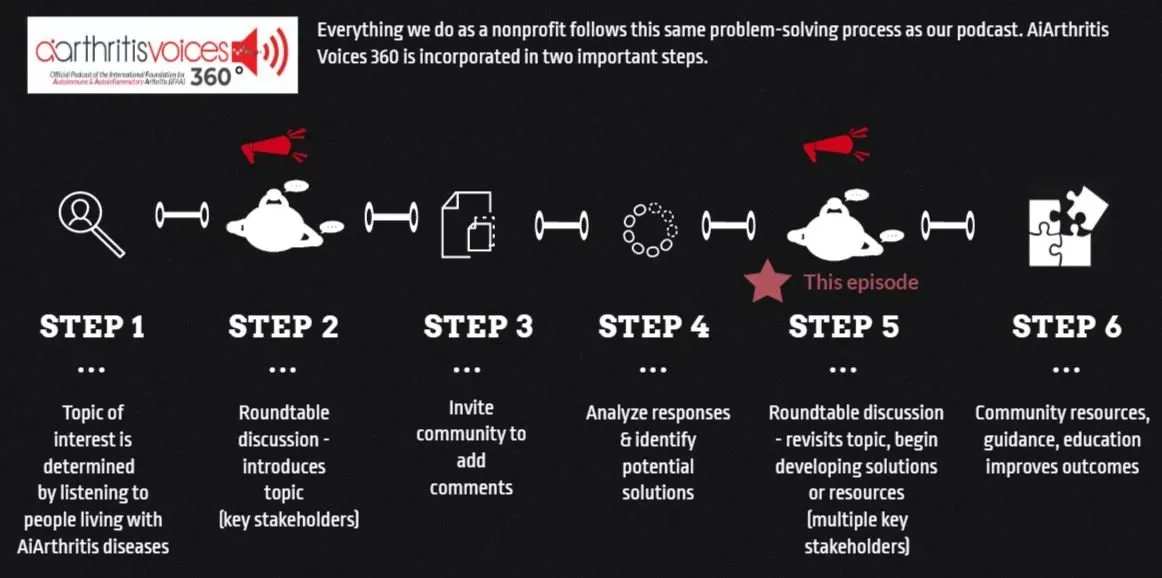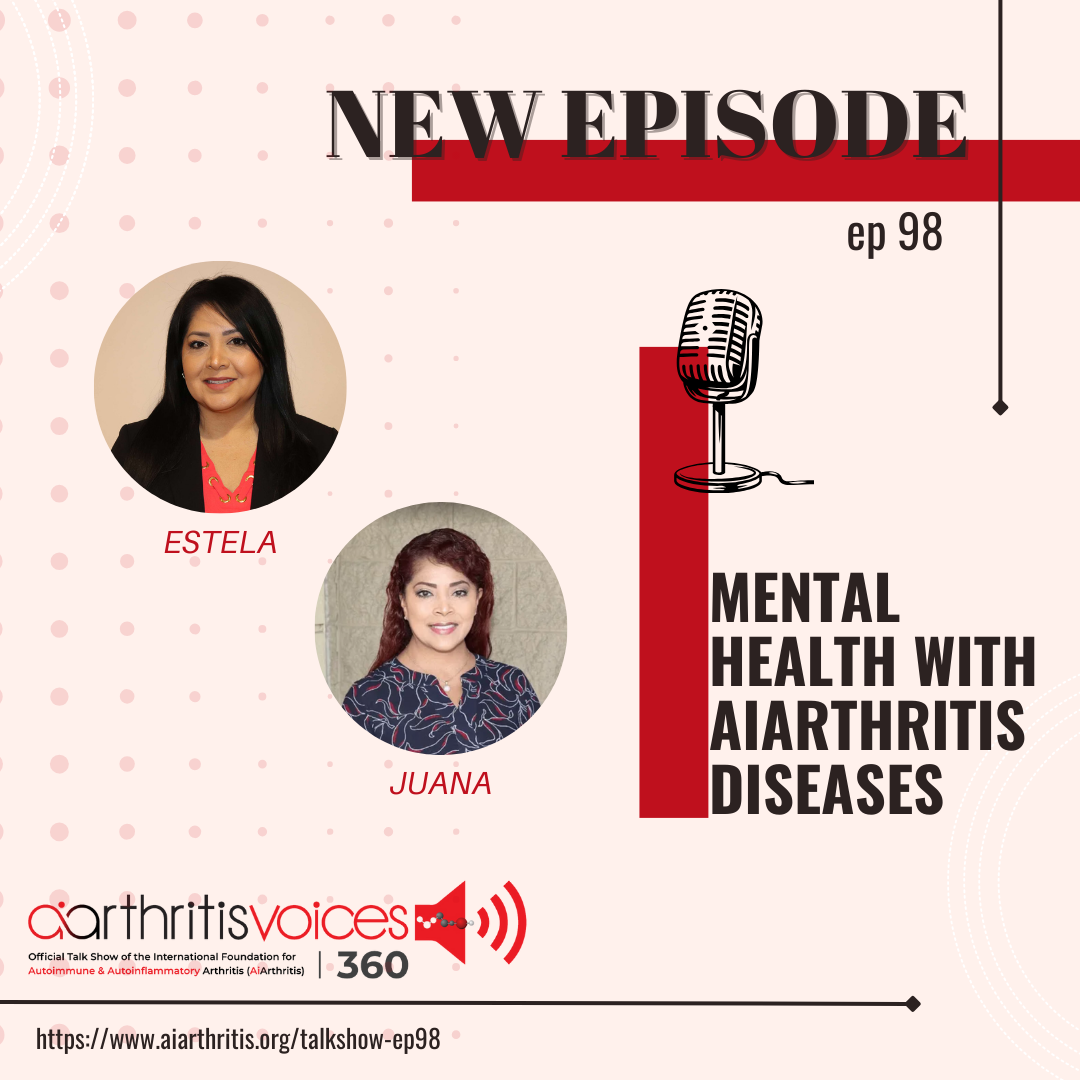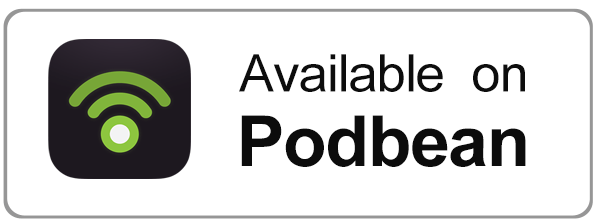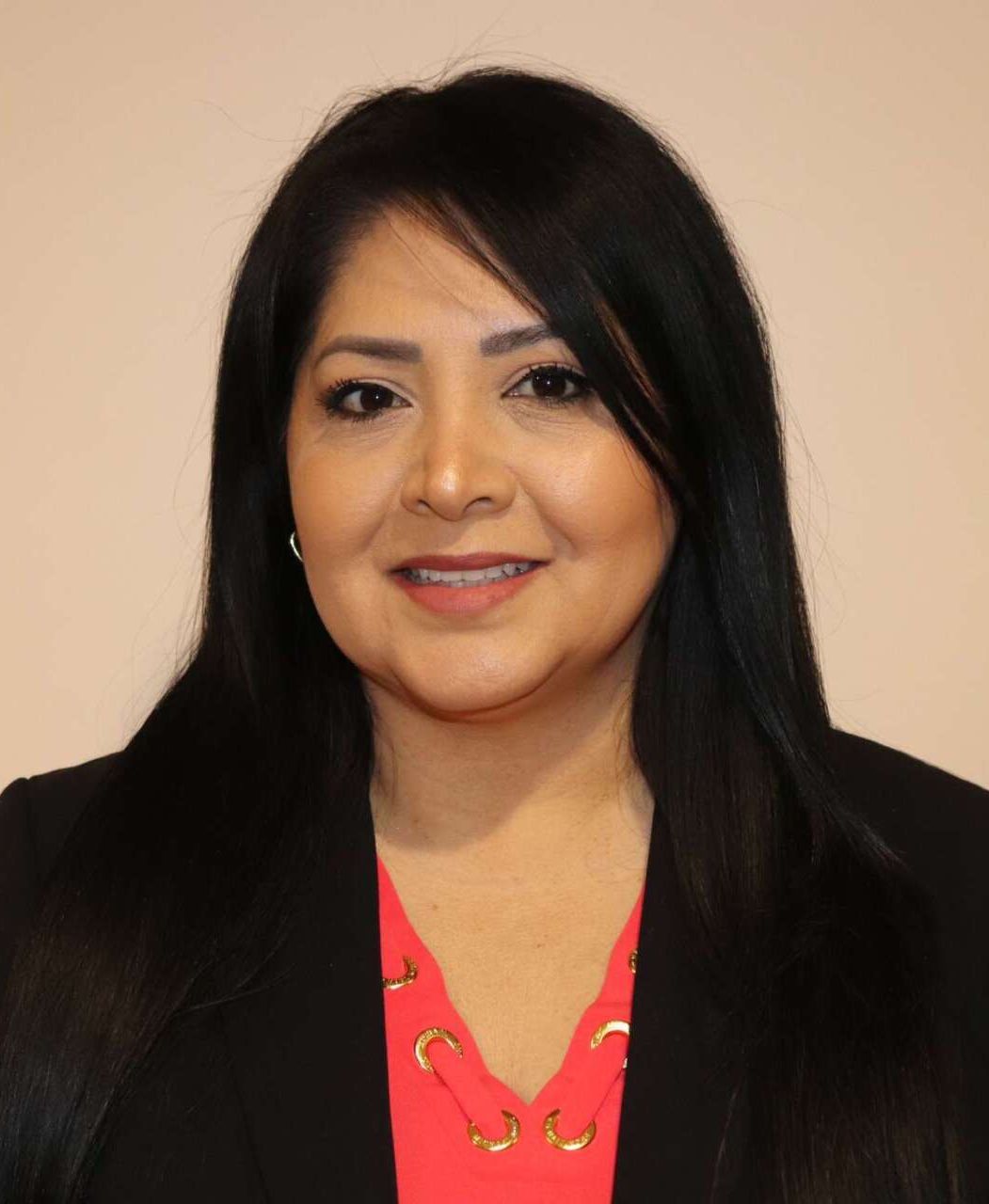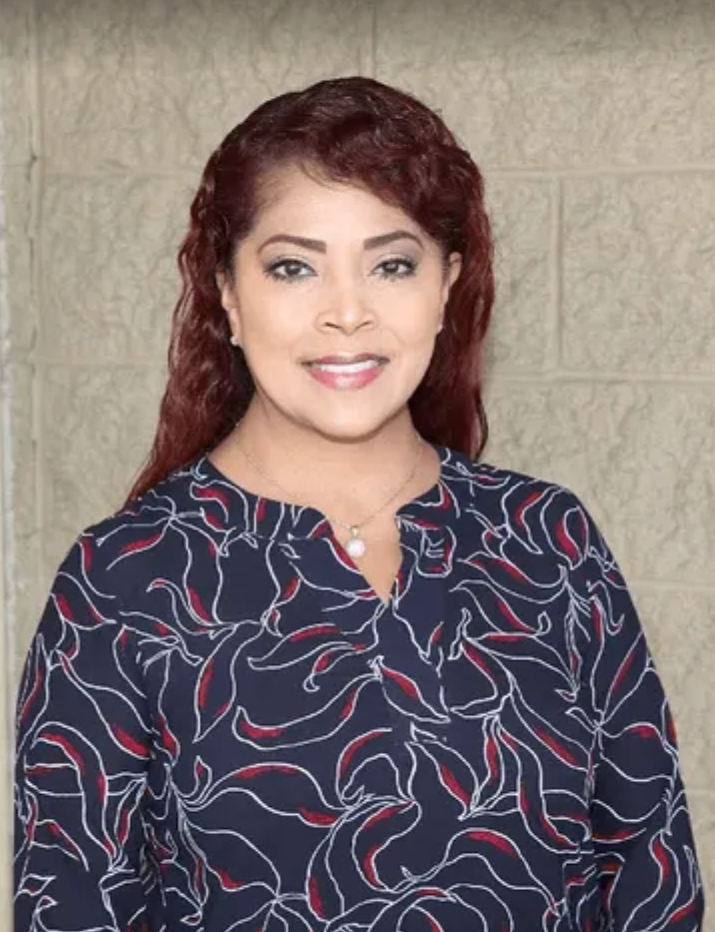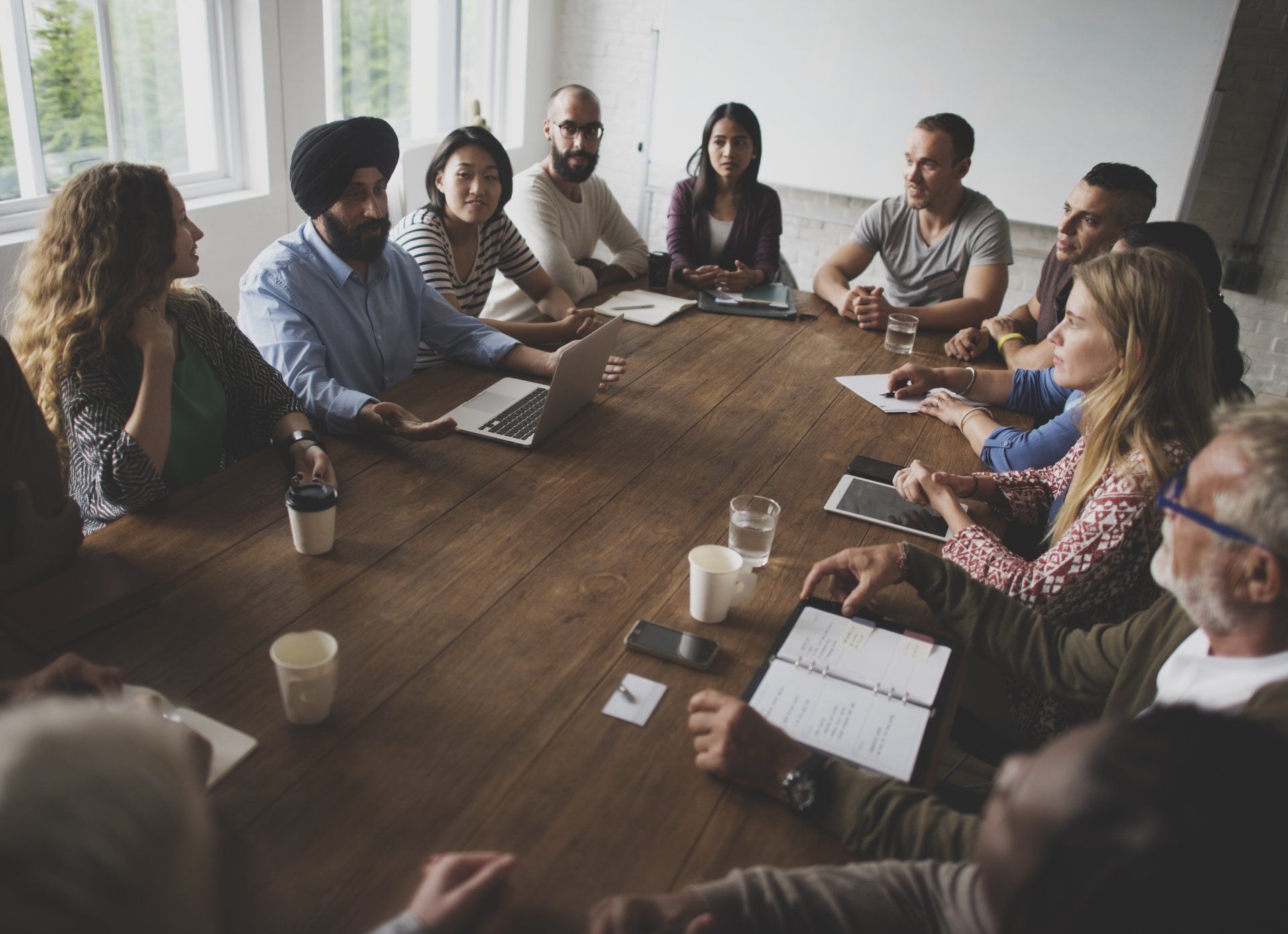[00:00:00] Intro: Welcome to AiArthritis Voices 360, the podcast solving today's most pressing issues in the AiArthritis community. We invite you all to the table where together we face the daily challenges of autoimmune and auto inflammatory arthritis. Join our fellow patient co hosts as they lead discussions in the patient community, as well as consult with stakeholders worldwide to solve the problems that matter most.
Whether you are a loved one, a professional working in the field, or a person diagnosed with an AiArthritis disease, this podcast is for you. So pull up a chair and take a seat at the table.
[00:00:44] Estela: Hey everyone and welcome to AiArthritis. Voices 360. This is the official talk show for the International Foundation for Autoimmune and Autoinflammatory Arthritis. My name is Estela Mata, and I am a care partner, caregiver advocate, healthcare advocate. I live with fibromyalgia and rheumatoid arthritis, and I am your co host today.
Today we are going to explore the relationship between autoimmune diseases, chronic conditions, and mental well being. From autoimmune conditions like lupus to AiArthritis conditions, such as rheumatoid arthritis, we will talk about these chronic health challenges, the impact not only what they have on our body, but also the impact they have on our mind.
So join us as we navigate the science, share personal stories, and uncover coping strategies that will bridge the gap between both physical and mental resilience. This episode is a step five, which means we are reintroducing this topic. I'm so excited because I am joined here by an amazing patient advocate, a social worker, and one of the most giving people that I have ever met.
Yep. She has been a co host for AiArthritis for the past few years, amongst other amazing things that she does and that we do together as a team. I'm excited because it's my sister Juana. She is my partner in advocacy, co host for today and we are both co hosting such an important topic, the impact of mental health with autoimmune and AiArthritis conditions. Sister, welcome.
[00:02:29] Juana: Hello everyone. Estella, I mean, thank you for introducing me. I am Juana Mata. Like Estela said, we are advocates. We have been advocating not only for autoimmune conditions such as arthritis, lupus, but we've also done so many other things together. And again, I'm Juana Mata. I am one of the co hosts today.
[00:02:53] Estela: Yeah, so we do everything together. We've been doing it since I was born because she is my big sister. So I'm excited because not only do we share a lot of things that we do together, we obviously have a family together but we do a lot of our advocacy together and our advocacy started when Juana was diagnosed with an autoimmune condition, and now we both have autoimmune conditions, but I want to go back and kind of start from the beginning and, and say, you know, that living with an autoimmune disease or an AiArthritis condition can be difficult.
And the conversation we're going to be having today is really dear. to us because we started advocating and raising awareness about these conditions and the impact they have, not only on our physical health, but also in our mental health. And that was one of the reasons why we started not only raising awareness about these conditions, advocating, but supporting those living with these conditions, their loved ones and care partners.
But before we get started, I'm going to talk a little bit about, for the people that are just tuning in for the first time or don't really know what an autoimmune disease is I'm gonna be talking about, a little bit about what that is. So let's start by providing the definition of autoimmune diseases and their impact on overall health including mental health.
So according to the CDC, autoimmune diseases occur when the immune system mistakenly targets and attacks healthy cells and tissues within the body. This leads to inflammation and damage in various organs or systems. Some examples of these conditions are lupus, rheumatoid arthritis, multiple sclerosis, and type 1 diabetes.
A lot of these conditions that I mentioned are the ones that we are living with. And so I know that it is very challenging to live with these conditions because of the unpredictable flares that these conditions cause. And also just the challenges that they bring us, right? Just with our daily life.
[00:05:03] Juana: Right. You know, one of the things is Estela is like we always talk about, you know, how, how it affects us, but you know, our mental and emotional impact on this condition, such as, like you said, lupus, rheumatoid arthritis, and other rheumatic diseases is nothing to be ashamed of. I mean, they are invisible, but we really need to talk about it. We need to bring awareness and together make a difference because we really need that visibility. We need to help ourselves and help others.
[00:05:33] Estela: Yes, and stopping the stigma of mental health, I think is one way to start and having these conversations that we're having today. So I agree with you, you know, it is so important because not only do these conditions impact our daily lives, they impact the lives of the people that we love, the people that take care of us, the people that we interact with, whether it's at home with family or at work. Right? You're a social worker. You, you're, you do a lot of work for others. So you being well, whether it's physically or mentally, is going to impact the people that you serve.
[00:06:10] Juana: Absolutely, Estela, I agree with that because, you know, being stressed or, or having anxiety symptoms is not only going to be affecting me, but it's going to affect how I work with others.
Like you said, being a social worker and working with others, helping others is definitely is going to be affected. Why? Because I'm not going to be able to cope or, or the anxiety, I'm not going to be able to think the right way when I'm trying to help them.
[00:06:37] Estela: Yes, and you know, May is Lupus Awareness Month.
It is Mental Health Awareness Month and Fibromyalgia Awareness Month. And there's a lot of information out there about the impact that these autoimmune diseases and AiArthritis conditions have on our mental health. And you know, I was digging up some statistics and I'm like, let me find out what percentage of people that are living with these conditions have been impacted by mental health.
And when I was researching this, I came upon an article that was written by the autoimmune registry, and they looked at data that was provided by the all of us research program, which is a program that both you and I are virtual advisors for. So the all of us research program is funded by the National Institute of Health.
So they collect data from both healthy people and people that may be living with conditions or chronic conditions. So the autoimmune registry did this research out of the all of us data database and they found that, get this, 52% of patients diagnosed with autoimmune diseases were diagnosed with a mental health condition within a year.
Specifically, 35 per 35% diagnosed with depression, 34% with anxiety and 24% with both depression and anxiety within the same year. That is huge. And now when you're looking at those statistics, it's pretty scary. But yet, it's not shocking to us, right? Because I know with you, and, and, and looking at so many people now being diagnosed with autoimmune diseases and autoimmune conditions and AiArthritis conditions, with you, Juana, it affected you not just physically but also emotionally. So can you talk about about your personal story about the impact that your diagnosis with rheumatoid arthritis, which you were diagnosed first with rheumatoid arthritis, and then lupus, how both of those diagnoses impact your mental health.
[00:09:00] Juana: Well, Estela, you know, I have to say that if it wasn't for the support from my family, especially you, I would not be here today, not only physically, but emotionally as well, because lupus did affect me and rheumatoid arthritis did affect me in many different ways.
You know, one of the things that, you know, you start thinking immediately is about the limitations, you know on your daily life and managing the treatments I mean, it's just so many things that you know, when you're newly diagnosed you start thinking about you know how is this gonna affect my children? How is this gonna affect me? And so Definitely, when I was diagnosed, my emotional mental health was affected. I initially didn't know how to cope with it because all these emotions were just coming to mind. But one of the things that I started doing to help me relieve all the anxiety and stress of a condition that I did not know about was loom knitting.
I started loom knitting because I knew that with focusing on something other than what am I going to do tomorrow? How am I going to be tomorrow? How am I going to be, how my body's going to react tomorrow is something that helped me. So managing my treatment, sorry, managing my my emotions by loom knitting helped me.
So after my diagnosis, I started loom knitting because I knew that if I didn't focus on something other than the condition and the limitations that I had at the moment was gonna really affect me and my family, my young children.
[00:10:43] Estela: What is loom knitting? For those people that don't know what loom knitting is, can you explain it a little bit?
[00:10:50] Juana: Yes loom knitting is a form of crochet or crocheting. So, due to the limitations that I was having at the moment with rheumatoid arthritis, my hands were very stiff. I could barely move them or I could even, you know, write. So let alone, you know, doing or crocheting. So I found a looming kit and I just wanted, like I said, I wanted to focus on something else.
So I started making scarves. Loom knitting is you buy a loom looming kit where you get yarn and you start looping one loop at a time to finally come up with either a beanie. or a scarf. So that was something that I started doing. So loom knitting was easier for my hands. It was easier for my mental health because I was focusing on what I was doing.
So that's what loom knitting is.
[00:11:48] Estela: Yeah, thank you for describing it like I know what it is now, right? Because right away, remember when you first started doing that? And then, you know, we would be meeting at my mom's house and and just like we do every single weekend, right? And we hang out and we were just trying to figure out how were we going to support you, right? Not only by learning about what lupus was, this autoimmune disease, learning about what rheumatoid arthritis was, but we wanted to learn about how we could help you and we didn't know much about it. I know my mom really blamed herself and she didn't know how to help you.
She didn't know what to say. I remember you know, us trying to figure out how we could help you and, and just knitting, right? My mom would crochet and you know, for a lot of people that don't know this, like we are, we are originally from Mexico, from Mexico. And my sister and I were very young when we came to the United States and in Mexico, a lot of like the ladies crochet and you know, they're always, you know, crocheting.
They sit outside, you know, after they clean, they cook, they have dinner. And they're just living their lives, right? Just talking with their neighbors. And that's really what we were doing with my mom and, and my sister in law. And so the loom knitting, even though I'm not good at it, I picked up and I wanted to learn.
And, and I wanted to help, you know, I guess, I mean, I don't know what the word is. I wanted to help myself learn so I can help you. And I know we don't, we're not all loom knitters. You know, we're not all going to crochet. We're not all going to be doing that. So, but it, it, we tried, right? So we started incorporating this in our support groups, but, and we also realized that not everyone was going to loom knit. Not everyone was going to pick up on crocheting either. So we, that's when we, we started.
[00:13:46] Juana: Especially in California, living in California, right? Right. So, who wants beanies and cowers curves? But it was a form or something that I started doing that helped me. And, and I mean, we truly feel that not only loom knitting, but doing any type of art therapy is going to help with mental health. And that's what I started doing not only illuminating and, but I also started painting. So there's different things that somebody that is going through an autoimmune condition, not only to reduce the stress, but the anxiety as well, or even depression, you know, just focusing on something other than thinking about your limitations, why you can and why you cannot do and what can happen to you tomorrow or what can happen to me tomorrow.
So definitely art therapy, which is loom knitting is our therapy, and that's something that we, Estela and I with Looms for Lupus started doing. We started incorporating art therapy, loom knitting being one of them.
[00:14:53] Estela: Yes. And, you know, one of the things, you know, I love that, that you shared is you started doing that even though you couldn't really move your hands, right.
And you figured out a way to relieve that stress by loom knitting, but also you picked up creating your own way of using that loom knitting, you created a little technique that would help you be able to fold your, your hands and, and use your hands, even though your arthritis was really causing a lot of pain on your joints.
[00:15:24] Juana: Absolutely. I mean, and, and that's, you know, that's something that we always have to do, you know, we always have to find ways to continue because we cannot focus on what we cannot do. We have to find ways and that's something that also will actually, I mean, how can I explain it? One of the things that affects us with our emotions is not being able to do things, but we always have to find ways still doing what we want to do. So yes, I definitely found a way on how to loom knit though. It wasn't easy at the beginning, but with techniques and looking for ways to do it, I was able to loom knit a couple of beanies, I loom knitted a couple of scarves, I gifted a couple of shawls from loom knitting.
[00:16:16] Estela: Yeah, and you know, it's amazing because again, you know, it's not all about loom knitting. What we're talking about is just finding different strategies and coping mechanisms to deal with when you're living with an autoimmune disease or an AiArthritis condition. And you know, when we're talking about this, we're not talking just about the, to the individual about coping mechanisms.
We're talking to the, about also, coping mechanisms for the caregiver and the families and the loved ones. You know, when we're looking at the impact of autoimmune diseases and, and or AiArthritis conditions in the United States, there are about 5% to 8% percent of the U. S. population that are diagnosed with autoimmune diseases.
That's a lot. That's pretty high. And so when we're looking at the big picture, it's like, let's talk about the impact of autoimmune diseases. and AiArthritis diseases and the impact that it has on our mental health, right? And let's talk also, and you just shared a little bit about a couple of coping mechanisms that you use, but the next thing that I want to talk about is just different strategies that we can utilize when we're coping with autoimmune and or AiArthritis conditions, right?
[00:17:39] Juana: Before we go into that, I really want to also focus on, you know, this autoimmune conditions or AiArthritis conditions is not only affecting the patient, it's also affecting the caregivers and loved ones. So it's very important for us to help our caregivers and our loved ones incorporate all these techniques because the patient is not the only one that's affected.
So we want to make sure that. You know, all these techniques are also practiced not only by the patients, but also by the caregivers, loved ones, and mental health or mental health is not only affected because we're going through this changes in our bodies, but our caregivers looking at us and not knowing what's going to happen with their loved one is also hard for them. So definitely a caregiver is affected.
[00:18:32] Estela: Yeah, and I think, you know, I think that's the it's the unpredictable, right? It's these flares that these autoimmune diseases or AiArthritis conditions cause and not knowing, you know, how, how bad they're going to be, not knowing when they're going to come, not knowing how it's going to impact our daily lives, how it's going to impact our loved ones, how it's going to impact our physical lives as well, how it's going to impact our love life, our marriage life, our, you know, our life just in general. And I think that is the stressful part of it. is the unknown, right? The unknown the unknown of the impact of the flares, the unknown of the impact of this disease.
So I'm with you. You know, one of the reasons why when I first started the podcast, I talked about me being an advocate for healthcare. I mean, for care partners and loved ones. I put that first because that was really my role and also understanding that our role does change throughout the process. You know, I first, when I, we first started advocating together, we advocated as the sisters, you were living with the autoimmune diseases and rheumatoid arthritis and arthritis conditions.
And I was there as a supporter. I was there as a loved one, as a caregiver. And now, as of last year, I now was also diagnosed with rheumatoid arthritis. And that has shifted a lot of things. And, you know, for those of you that don't know this, it is so difficult to know that you could be the best advocate for someone else.
But when it comes to you and you realizing and accepting your condition, it is a whole other ballgame. And I've have been struggling with it. I have been struggling with it since December when I was diagnosed with rheumatoid arthritis. Not many people know that I do live with rheumatoid arthritis.
And that is why I wanted to talk about this because, you know, we transition into different roles in our, in our lives. We are healthy individuals. We are loved ones and care partners to someone that lives with an autoimmune or AiArthritis condition. And then we may also be the patient as well. And give ourselves the opportunity to accept those different roles.
Give ourselves the opportunity to learn about the conditions and give ourselves the opportunity to to go through those grieving stages on when you are diagnosed. So we always say this, it's important for you to learn about your condition. It is important for you to learn about how to take care of your bodies and yourselves, and then learn about how to communicate with your care providers, with your care partners and with anyone around you, right, that you're dealing with. But most importantly, practice self care, practice to learn about how to take care of yourself. And with this next topic, yes, I want to talk about different ways that we can prioritize our mental health, different ways that we can use and different things that we can do to help ourselves.
And so, you gave an example, Juana, about setting yourself as a priority in self care. Right. What do you do when it comes to physical activity, regular exercise? I know you, you're dying to give us a couple of tips. I know you do. So self care is prioritizing physical activity, regular exercise, reducing stress and also eating healthy. So what do you do or what tips can you give us about that?
[00:22:31] Juana: Well, before I give you or I share what I do, because we're all different, we're all different and not because I talk about doing certain things that help me means that everyone is going to be able to do them.
But one of the coping strategies that I always talk about is also is understanding your limitations and boundaries and you know, understanding the changes that your body is going through, you know, and especially with lupus and rheumatoid arthritis, there's going to be so many similar things and there's going to be so many different things, but you have to understand and listen to your body.
And you also have to learn how to say no, when you know you can't do certain things. But one of the things that I, I like to do is I like to always focus on something else. I like to be positive and, you know, being grateful, grateful every morning I wake up because waking up is already something that, in my opinion, is very positive.
I'm healthy. I'm alive. I'm breathing. I'm here today. So being positive is one of the things that I always, you know, practice staying positive. Even if things are not going the way I want them to go, I have to stay positive, practicing gratitude, and of course, you know, doing things for my body, like exercising.
And it doesn't mean that I'm going to go to the gym and lift weights. It means that I am going to do what I can do. Sometimes it's just taking a few steps. Other times means taking a run. But again, we're all different and we always have to do things that we can do.
[00:24:24] Estela: Yeah. So as far as physical activity, what do you do when you're feeling good?
What type of physical activity do you do?
[00:24:33] Juana: I like to walk and I like to I have a bike, a stationary bike. So I do bike, I do a I have a stepper. So I do steps on my stepper. And I also like to, now I started incorporating, I have a vibrating plate that for me, it has helped me with my blood flow. So that's something that I do, but again, not everyone has a stepper or a vibrating plate, or a stationary bike. So, other things that I also do when I am away from home is I always carry my stretching bands or, I believe that's what they're called. So I, I stretch. And so, or sometimes while watching TV, if I can't be moving too much, standing, I just pretend like I'm walking, you know, stationary walking.
[00:25:24] Estela: So some sort of movement is really what helps you, you know, I love, I love that you giving so many different options for people that are listening those are different ways that you can move and prioritize you know, your physical activity and practicing self care and all those different ways that you indicated are very, very important.
When it comes to mindfulness and relaxation techniques. So those are kind of like the, the techniques that I like to do more. I know you're more physical and, you know, and not, you, you don't always do those physical activities, but when you can, you do them. For me, mindfulness and relaxation techniques are my go to.
So these are mindfulness, meditation, you know, breathing exercises, things that are going to help me relax my muscles. And all of these techniques, really what I'm focusing on is relieving my stress, relieving my anxiety, and promoting my emotional balance. And what do I mean by this? So a couple of things that I do.
So Everyone that knows me, I like to talk a lot, right? I like to talk a lot. And that means because my brain is always working on different things. So I could be here right now, but also focusing on what I'm going to do after right now, after I finished this podcast, what I'm going to do tomorrow, where my daughters are at.
I mean, my brain goes a million miles and the only way that I can actually, you know relieve that stress is by calming my body. And the way I do it is by breathing techniques. So breathing techniques are a good way for me to relax. So for me, I do the four, seven, eight technique, which I breathe in, you know, counting up to four, I hold it in counting up to seven, and then I exhale counting up to eight and those that's the four, seven, eight techniques.
So I do that at night. And the way I do it is obviously I count in my brain in my head. I don't count out loud otherwise my husband would be leaving me in the room by myself. But I do this because I guess the counting helps me focus on the numbers instead of other thoughts that are going a million, a million different directions in my brain.
So that actually helps me sleep. Another thing that I do is I like to practice mindfulness. like what we call nature mindfulness. And I learned this technique with our licensed clinical therapist with Ruth, who also is part of the support groups that, that, you know, we host monthly and we, where we incorporate different modalities.
So I learned that going outside barefoot helped me feel grounded, just feeling the grass, right? I was using my senses, the touch senses feeling touching the ground. Smelling, I was smelling the flowers and, you know, I know it sounds kind of, you know, cliche, like stop and smell the flowers, but. really do that because that helps you focus and practice mindfulness.
You're stopping, you're focusing on the scent, you're thinking about what it smells like, you're only focused on that moment and that thing. So looking at flowers, feeling the air, just listening to the birds, like all of that is mindfulness. And that's what I like to use. I like to go outside and even though I don't have a green thumb I love, I love nature and that keeps me grounded.
And that's one of the things that I like to do.
[00:29:02] Juana: See, and that's something that I always love to continue and repeat. That we're all different, you know, not because that's helping you means that it's going to help me. I can tell you, I am not one to stop and smell the flowers. To me I wouldn't be able to do that.
So we're all different. You as a patient, you have to find what works for you, what helps you. So yes, Estela, you know, she loves to smell the flowers. I can't do that. You'll rather plant the flowers. I'd rather plant the flowers. Yes and that's, I mean, again, you have to find your own way doing something that's going to help you, you know, I can do yoga.
Estella will be able to do yoga. I should tell you my relax week. That's not going to relax her.
[00:29:52] Estela: I have to share this because you brought the yoga up and I want to make this a fun, you know, podcast because that's who we are. So we had once we, you know, we're like, we're thinking about what can we do, you know, with our support group.
So we brought in a yoga instructor and she came in and she was so gracious and she brought mats and we were all going to do yoga. And then I realized that I couldn't do yoga because I had to stay quiet. This girl cannot stay quiet. Number two, I kept cramping, like every time we would have to hold the pose, I would cramp and I couldn't do it.
So needless to say, I had to realize, I realized I tried it. I tried it. It's not for me. So yoga is not for me. Yoga is not for everyone. I mean, I don't know maybe if I had the, what is that yoga where they have the goats, goat yoga? Maybe that'll be fun for me because I'll be distracted with a goat. But, you know, but that's for another day, right?
But you know, one of the things that I think we have enjoyed doing together is support groups, right? You love to be a facilitator to support groups. I love it. We do it together. We've been doing it. We've been co facilitating support groups since 2012 through the Looms for Lupus support groups. And we support, we provide support virtually and in person.
And we do it in such an amazing way where we get to connect with loved ones, caregivers, and also those living with these conditions. But that's one of the things we both love. We love to connect with others. We love to connect with friends. And that's one of the things that I think is also good.
That's another great way for you to connect with someone. So if, if yoga is not for you, if exercise is not for you, that's okay. Find a way to release your stress. Take painting, you know, Juana was talking about painting, right? We also brought painting to the support group, but you picked it up on your own as well, Juana, you started painting.
[00:32:05] Juana: Right. You know, one of the reasons why I started painting is because everyone would agree with me when you're when you are diagnosed or you're going through flares, you're taking a lot of medication. Medications that are gonna cause different side effects. One of them being, you know, unable to sleep.
You can't sleep. So what do you do when you can't sleep? For me, it was either getting up at four in the morning, exercising. And a lot of the times it's like, okay, well, I can't be exercising every time I can't sleep. So what else can I do to make me feel good or make me feel useful? So what I started doing, I started painting.
So at four in the morning, you would find me in the counter kitchen painting. So I have a few paintings. I am not a painter, but I learned to help me relieve my anxiety by painting. And that's something that, like Estela said, we incorporated in our support groups. We've always been about, you know, what can we do to help others?
What can we do to relieve stress? And it's not only, you know, just painting is okay this is helping me focus on making a straight line, for example. So yes, definitely painting has been part of my journey because it has helped me focus on something other than just the pain that I'm going or thinking about, am I going to be here tomorrow?
Am I going to be here for my children tomorrow?
[00:33:41] Estela: Yeah, so thank you for sharing about you and painting. And, you know, I know we've incorporated painting, you know, different tape painting canvases that we've done. And, you know, we, we did that with a wellness day and we incorporated colors like the lime green for mental health and the purple for the purple butterfly, and then also a flower indicating hope. So, you know, it's great to be able to share that there are different ways to cope with, with these conditions. But also another thing that I was going to talk about is journaling, right? Journaling is a great way to, if painting's not for you, loom knitting's not for you, if exercise is not for you, if yoga is not for you, mindfulness, breathing techniques, then look into maybe writing, right?
Journal your, your feelings, monitor them, track, you know, what's triggering them, what's making you feel better, what's making you happy, what's making you sad. If you start monitoring, then share it with your therapist, share it with your provider and see what they can do. Also, If none of this works, like going to a counselor, going to a therapist and talking about different modalities that can help you.
There's cognitive behavioral therapy that can be done to manage stress, to manage the anxiety and depression. Maybe this therapist can actually create something that works for you, right? And they can provide strategies tailored specifically for you. So don't rule that out. Also, If you don't want to talk about therapy or different modalities, let's just call them hobbies, hobbies or activities, right?
So find an activity or a hobby that you can participate in with your loved ones or by yourself that you enjoy. So whether it's art, whether it's music, whether it's playing music or just singing, whether it's writing, whether it's reading, whether it's riding a bike. You know, whatever it is, find something that is going to help you.
And then most importantly, connect with others. Connect with others that are going through similar situations that you are going through. Connect with other people. Connect with loved ones and share your journey and also learn from their journeys, right? I've learned so much from Juana. You know, I've learned so much, but I've also had to learn for myself a lot of things.
[00:36:18] Juana: Remember talking to others is therapeutic and not only will you be helping yourself, but you're going to be helping others by sharing what you have done to help yourself. So definitely, you know, surrounding yourself with others, loved ones, warriors, and knowing that they understand what you're going through is going to help you definitely.
[00:36:40] Estela: Yes, you know, I know we've talked a lot about a lot of things today. We've talked about autoimmune diseases, you know, like lupus arthritis conditions like rheumatoid arthritis and the impact that they have on our mental health and a lot of the anxiety and stress that the unknown of what the flares or what these conditions are going to be bringing to our bodies or the impact that it's going to have on our social life or our daily lives.
And that's very overwhelming. So we've talked about that. We talked about the impact that it has on ourselves, but it also the impact that it has on the people that we love. And then we also were talking about the different modalities that we can utilize day to day. Whether it's self care practices, you know, whether it's exercise, whether it's engaging in physical activity, whether it's mindfulness, relaxation techniques, breathing techniques, going to a therapist, monitoring your thoughts with a journal, or engaging in these hobbies or activities with your loved ones, or just alone by yourself.
We learned so much today, but I think the most important thing that I want to leave everyone with is being diagnosed with rheumatoid arthritis, with lupus, with fibromyalgia, or with any other condition, it is not the end. And these conditions do not define who you are. I want you to know that you are not alone, that you are not in this journey alone, that we are in this journey together.
So that AiArthritis Foundation Tiffany, you know, Leila, Deb, so many other patient advocates that I can't remember right now because I'm having fog fog, brain fog. But there's so many patient advocates that are working together that are here to support you. There are patients advocates and there are people like Juana and I that are here to support you.
And we love the AiArthritis community because we are the AiArthritis community. We live with these conditions. We know what it's like and we want you to know that you are not alone. And I don't know, that's, I just had to say that.
[00:39:08] Juana: Right. It's sister together with AiArthritis, we are needing a community of hope.
And remember, you are not alone. We are not alone. We are all in this together. We need to not only bring awareness, we need to help each other, we need to learn from each other. We all have something we can share because we are in it together.
[00:39:34] Estela: Yes, and, and just like, you know, I know with lupus, there are no two people that have lupus the same way or that it affects the individual the same.
We are all unique individuals and we all deal with all these conditions very differently. But the one thing that I want to say is that you know, we are more, we are more than, than these conditions. And I just want to leave you all with that. I remember, you know, the AiArthritis Voices 360 talk show is really patient voices coming together to speak and to have conversations with other patients, with other leaders with health care providers and bringing everyone together. There's 360 conversations, right? There are 360its, which are spin off conversations. And there's so many topics. Today, we talked about, you know, our topic was mental health and with AiArthritis diseases. We love to talk about mental health because Juana and I from the get go knew that there was a huge impact back when wellness and mental health was not a fun thing to talk about when it was not the talk of the town when it wasn't cool to talk about mental health.
Juana and I, along with our amazing licensed clinical social worker therapist, Ruth Padilla King. So shout out to her. We incorporated meditation, mindfulness, art therapy into our support groups because we knew that by empowering the individual. with the knowledge and skills that they would be able to continue to thrive despite living with these conditions.
And in 2012, it wasn't cool. And a lot of people laughed at the fact that we would loom knit. A lot of people would laugh that, you know, we are painting rocks. We're painting rocks. A lot of people would laugh that we were talking about breathing techniques and it wasn't cool back then. And then fast forward to four years ago.
We had our vision and we said we wanted to take it to the next level, right? We wanted to not just have all these different modalities and techniques in our support group that now is also virtual. By the way, we have a global, global support group. That's the silver lining of the pandemic. We are able to reach people from all over the world, from France, from Mexico, from Honduras, from Peru.
I mean, you name it. So many people have been connecting with us. And four years ago, we said we're going to do a wellness day. and still wasn't too cool. It wasn't that cool, you know, four years ago. And so we brought, we did the, a virtual wellness day. Fast forward to this month, we have, we hosted our fourth annual wellness day where we provide not just information from healthcare professionals on these conditions that we live with, but also we bring in the most recent and or scientific studies and research studies that are happening around our conditions.
And we provide all of this for free for loved ones, caregivers, the community as a whole. And we also give everyone workshops and teach them different modalities to cope with mental health. And so anyways, I just wanted to bring that up because I want everyone to know that no matter what you are doing, keep believing in yourself.
Keep believing that what you are doing is going to make an impact on you. It can make an impact on someone else. So share the things that you love to do, share your experience with these conditions with others, because you never know who you're going to be able to help, right Juana?
[00:43:49] Juana: Correct. Correct. You just have to, you know, share and let's just, again, start leading a community of hope with others.
I know Estela and I have started doing this since my diagnosis and shout out to all those advocates, all people that are with us, you know, helping others because at the end, the support that every patient needs is important.
[00:44:21] Estela: Yes. So that wraps up our podcast for today and I hope that other people can join us and volunteer and be part of these amazing episodes.
We have volunteer applications. They AiArthritis Voices is ready to hear from you. I know there are other things that, you know, you can connect to right now. There's, there's a grace and able chili red. That I think you could still could get a discount on. So please go on to follow AiArthritis on social media platforms.
You can find the AiArthritis social media platforms and Facebook, Instagram, Twitter, and they are under IFAiArthritis. So thank you everyone for tuning in. If you want to learn more about mental health techniques, join us and you can also follow us at Looms4Lupus on all social media platforms. That's the at sign.
l o m s 4 lupus. Thank you so much and see you all next time.
[00:45:33] Intro: AiArthritis voices 360 is produced by the International Foundation for autoimmune and auto inflammatory arthritis. Find us on the web at www. aiarthritis. org. Also, be sure to subscribe to this podcast and stay up to date. Today on all the latest arthritis news and events.
